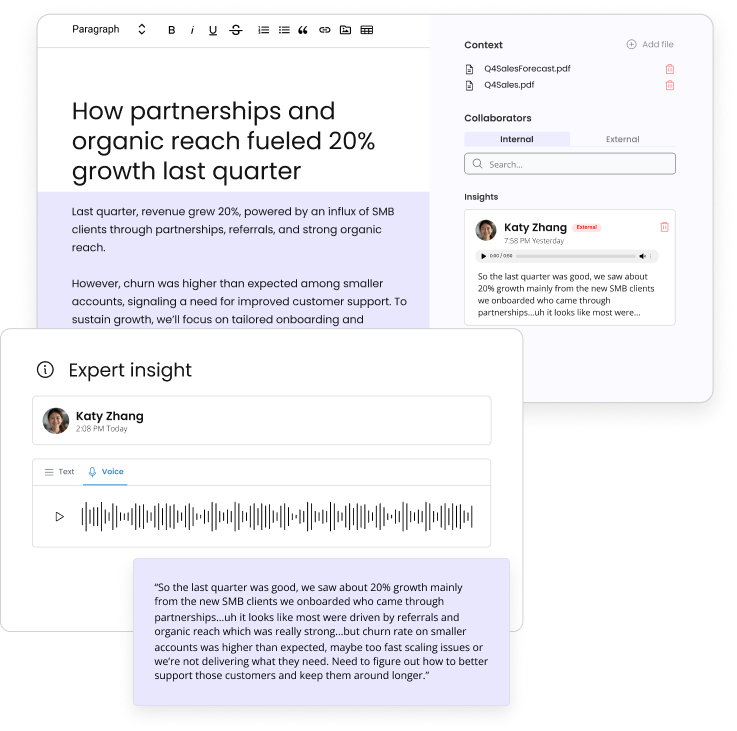Table of Contents

Authority scales when expertise comes first
Wordbrew helps teams collect expert insight before AI ever writes a word.
Built for expert-led, review-safe content
- Home
- »
- Content Marketing
- »
- AI Content for SEO: How to Do It Right
-
Christina Ballinger
- 8 minutes read time
AI Content for SEO: How to Do It Right
- Home
- »
- Content Marketing
- »
- AI Content for SEO: How to Do It Right
AI Content for SEO: How to Do It Right
Table of Contents

AI content for SEO is changing how we approach creating content and search engine optimization. SEO helps search engines understand your content, making it easier for users to find your site and choose your link, while AI can help you produce high-quality, relevant content at scale.
Can AI content help your search engine rankings? In our experience, it can. As a content marketer, I’ve seen firsthand how AI can help improve content and SEO strategies. And three out of four B2B marketers agree: 78% use generative AI tools, according to the latest research from the Content Marketing Institute.
Whether personalizing your content, optimizing for search engines, or improving your technical SEO, AI offers powerful tools to improve your efforts. In this blog, I’ll share practical insights on how AI content for SEO can improve your search engine rankings and make your digital marketing more effective.
TL;DR: AI content for SEO
- AI content for SEO helps improve search engine rankings and user engagement.
- AI tools can assist with keyword research, content optimization, and technical SEO.
- AI-assisted content can increase relevance, user engagement, and technical SEO.
- Google prioritizes quality content that demonstrates E-E-A-T principles.
- Best practices include focusing on quality, regular reviews, personalizing content, and competitor research.
What is AI content for SEO?
AI content for SEO means using artificial intelligence to create content that helps you rank higher in search engine results—blog posts, how-to articles, or any other type of content written to attract more visitors to your website. AI tools can help you find the best keywords to use, make your content easier to read, and make sure it meets SEO standards.
Using AI for SEO content involves using intelligent technologies to make the process faster and better, scaling your content production without compromising quality.
Pro tip: If you’re looking to get started with AI for search engine optimization, Wordbrew can help! We’ve pioneered the hybrid content creation method, pairing AI with human expertise. Our experts can provide insights, guide you through the process, and create customized content to help you reach more customers.
Uses of AI content for SEO
You can use AI SEO tools to create high-quality, relevant content quickly:
- Use generative AI tools to assist with creating blog posts, articles, and social media content (we’ll discuss this more in a bit).
- Find the best keywords to use and get suggestions for optimization with AI SEO optimization tools.
- Refine page titles and meta descriptions to match search behavior with generative AI.
- Automate repetitive tasks like data analysis and keyword research.
- Analyze keyword data and suggest content topics.
- Perform content gap analysis to identify areas for new content creation.
- Get content optimization suggestions.
- Identify backlink opportunities to improve website authority (backlinks are links from other websites to your website) with AI SEO tools.
- Optimize images and videos for SEO, improving search visibility.
- Refine your SEO tactics with AI competitor analysis.
- Use automated SEO audits to save time with site optimization.
Is AI content good for SEO?
The answer is, it depends.
Search Engine Results Pages (SERP) are essential for driving organic traffic to your website. The higher your content ranks, the more visibility and clicks you’ll receive. AI-assisted content can improve your SERP positions in many ways.
1. Keyword optimization
AI tools are great for saving time on keyword research and optimization. We use AI-powered SEO tools like Ahrefs and Semrush to analyze search data to find relevant, high-performing keywords.
Focusing on the right keywords and using them effectively can increase your chances of achieving a higher ranking on SERPs. In fact, “39% of marketers list optimizing on-page content based on keywords as their top SEO strategy,” according to HubSpot’s 2023 State of Marketing Report.
2. Better content quality
Search engines prioritize high-quality content that provides value to users. When AI content is carefully reviewed and edited (this is a must!), you can consistently maintain high quality.
You can also use AI tools to check that your content is well-structured, easy to read, and error-free, which will improve user experience and increase rankings.
3. Increase content relevance
AI can analyze search intent and customize content to meet the specific needs of your audience.
By understanding what users are searching for and creating content that answers their questions, you increase the relevance of your content. Search engines tend to rank content higher when it aligns with user intent.
For example, say a local hardware store writes a blog on “Special Discounts on Gardening Supplies,” but users are searching for informational content like “Gardening Supplies for Beginners.” The store’s content isn’t getting traffic because it doesn’t match the search intent of its potential customers–the audience is looking for information and advice, not immediate purchase options.
4. User engagement
AI can help create content that engages users by making it more personalized and interactive.
When your content keeps users engaged for longer and reduces bounce rates, search engines take notice and recognize it as valuable, leading to better positions in the SERPs. Search engines give content with the best user experience a higher ranking.
5. Regular updates and fresh content
Search engines rank websites that regularly update content. AI can help you maintain a steady stream of fresh content, update existing ones, and identify content gaps (relevant content missing from your site).
Regularly updating your content keeps your site relevant and can help improve your rankings over time.
6. Optimize for voice search
As voice search continues to grow, it’s essential to tailor your content to conversational queries. According to a study from UpCity on consumers and voice search:
- 58% of consumers aged 25-34 use voice search daily.
- 43% of consumers aged 55 and above use voice search every week.
AI can understand natural language patterns and help you create content that matches voice search patterns—like using long-tail keywords and question-based phrases—to improve your chances of appearing in voice search results.
For example, a small coffee shop in a busy neighborhood might want to optimize for voice search to attract more local customers and increase its online presence.
Voice search queries are typically more conversational and longer than text-based searches. Instead of simply typing “coffee shop near me,” a user might use voice search to ask, “Where is the best coffee shop near me with vegan options?”
The coffee shop can use content written in a natural, conversational tone that mimics how people speak and include phrases that match how people ask questions in voice searches.
7. Improve technical SEO
With AI tools, you can conduct SEO audits to find and fix technical issues that could negatively impact your search engine rankings, like:
- Site speed.
- Broken links.
- Mobile-friendliness.
- Correct indexing.
A technically sound website offers a better user experience and it’s more likely to achieve higher rankings on search engine results pages.
8. Advanced analytics and insights
AI tools offer advanced analytics and insights to guide your SEO strategy. Tools like Google Analytics and HubSpot can analyze large amounts of data, identify trends, and predict user behavior.
For instance, an online boutique selling handmade jewelry wants to understand its customers better and predict buying behavior. They use AI-powered analytics tools and notice a spike in searches and purchases of custom-made necklaces around the holidays and special occasions. Using these insights, they publish targeted content on custom-made necklaces before the spike in demand.
These insights can help you make data-driven decisions to improve your SEO efforts.
9. Local SEO optimization
If your business targets local audiences, setting up your Google Business Profile can drive traffic: “Customers are 70% more likely to visit and 50% more likely to consider purchasing from businesses with a complete Business Profile,” according to Google.
AI can also optimize your content for local SEO by:
- Analyzing local search trends.
- Optimizing Google My Business listings.
- Creating customized content for local audiences.
Better local SEO increases your visibility in local search results and attracts more local customers.
Pro tip: Don’t have the time or resources to conduct thorough keyword research, create content, and keep up with the latest trends? Wordbrew’s team can help you create custom content that connects with your audience and improves your rankings.
AI content and search engine rankings
Why use AI for SEO content? It can save time on content creation, make sure your topics are relevant, and improve content quality. Here’s how:
- Analyzing search trends: Use AI tools to monitor search trends and adjust your content strategy to create content that meets your audience’s needs.
- Optimizing for user intent: AI can help you understand what users are looking for so you can personalize your content.
- Enhancing readability: AI can help organize your content to make it more engaging and easy to read, keeping visitors on your site longer and reducing bounce rates.
There are also potential drawbacks to using AI for SEO. AI-generated content sometimes lacks depth and relevance. AI may add keywords in a way that doesn’t make sense or use too many keywords—known as keyword stuffing. AI can also hallucinate, generating incorrect or misleading results.
Check out our case study blog and video from entrepreneur Samantha North for tips on how to avoid common SEO mistakes:
You should also keep Google’s guidelines on AI content in mind.
Google: AI-generated content and E-E-A-T
Google’s stance on AI-generated content is clear: quality matters. According to Google’s guidelines on creating helpful content, the search engine prioritizes content demonstrating Experience, Expertise, Authoritativeness, and Trustworthiness (E-E-A-T).
Who, How and Why
Google provided a content self-assessment for creating helpful, reliable, people-first content with questions for evaluating your content:
- Focus on content and quality.
- Demonstrate expertise.
- Avoid creating search-engine-first content.
- Ask who, how, and why about your content.
The How section specifically addresses AI content:
That said, there is a way to use AI and still create high-quality, people-first content: pairing human insight and experience with good AI tools.
💡Learn more: Does Google penalize AI content?
Here are a few tips to help you meet Google’s E-E-A-T guidelines:
1. Experience
Including real-world experiences or case studies related to your topic adds authenticity and helps build trust with your audience. For instance, if you are writing about business strategies, share your insights and examples of successful strategies or present case studies demonstrating how you have collaborated with businesses to increase sales.
Sharing positive feedback from satisfied customers also builds trust and demonstrates your expertise and experience.
2. Expertise
Make sure your content is well-researched and accurate. Include facts, statistics, and insights from reliable sources to show your expertise. Google values content created by knowledgeable experts.
3. Authoritativeness
There are many ways you can build your authority:
- Include citations from reputable sources to show experts in the field back your content.
- Link to your previous work or other authoritative websites to strengthen your content.
- Earn backlinks (or external links from other websites to yours) from credible websites.
- Add an author’s page to your site highlighting their qualifications, expertise, and experience.
4. Trustworthiness
Make sure that what you’re sharing is accurate and error-free. Double-check your work and make sure it adds real value for your audience.
Adding customer testimonials and positive reviews from satisfied customers also builds trust.
Pro tip: If you’re not sure how to meet Google’s E-E-A-T standards, Wordbrew’s network of subject matter experts can help you create authoritative and trustworthy content that aligns with Google’s guidelines.
Best practices for using AI content for SEO
To get the most out of AI content for SEO, follow these best practices:
Quality over quantity: Focus on creating high-quality content, even if it means producing less. Having a few well-written, valuable pieces is better than many low-quality ones.
Regular reviews: Review your content to make sure it meets your standards. You can use tools like Grammarly or Hemingway to check for grammatical errors and readability, but you still need human review for consistency and overall quality.
@wordbrewhq This is the BEST way to ensure your content strategy is unique — subject matter experts! #fyp #contentmarketing #contentcreator #contentstrategy #agency #digitalmarketing #viralgrowth #contentteam #subjectmatterexpert
♬ espresso sabrina – celebs media
Personalize your content: To engage your audience, create detailed buyer personas with their demographics, interests, pain points, and buying behaviors. Customize your content to address the specific needs and preferences of each persona.
Competitor analysis: Regularly review your competitors’ content to identify areas for improvement. Look for gaps in their content that you can fill or ways to offer a new perspective that sets your content apart.
FAQs
Can SEO be replaced by AI?
While AI technology can streamline processes and increase efficiency, human expertise, creativity, and strategic thinking are still essential in SEO strategies.
- AI can improve SEO efforts by automating tasks, analyzing data, and offering insights.
- SEO specialists are essential for interpreting AI-generated data, making strategic decisions, and ensuring ethical practices.
Can Google detect AI SEO?
Yes, Google recognizes AI-generated content used for SEO purposes. While using AI for content creation is not penalized, to rank well on Google, content must adhere to their E-E-A-T guidelines (Expertise, Authoritativeness, Trustworthiness).
Conclusion: AI content for SEO
When done right, AI content can improve your search engine rankings and help you create high-quality content, fast. By following best practices and staying informed about Google’s guidelines, you can create AI content that’s engaging and valuable.If you need help with your content and SEO strategies, contact Wordbrew!
Our team of experts can help you create SEO and AI content, reach more customers, and add to the success of your content marketing efforts.
